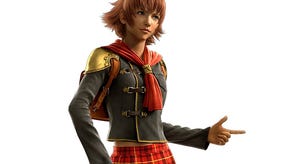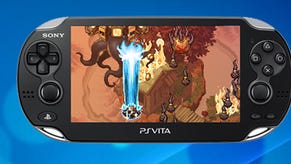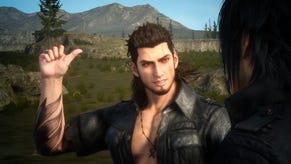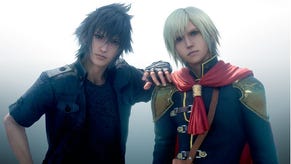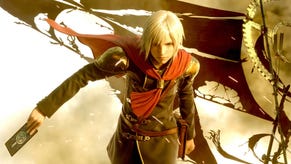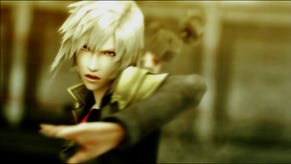TGS: Agito, Type 0, Fan Support, and the Intimacy of Portables
Our chat with Square Enix's Hajime Tabata explores his Final Fantasy projects and the importance of fan enthusiasm.
This article first appeared on USgamer, a partner publication of VG247. Some content, such as this article, has been migrated to VG247 for posterity after USgamer's closure - but it has not been edited or further vetted by the VG247 team.
Hajima Tabata has been behind some of Square Enix's biggest portable games of the past five years, from Crisis Core: Final Fantasy VII to Final Fantasy Type 0. Currently, he's working with Tetsuya Nomura on the long delayed Final Fantasy XV (formerly Final Fantasy Versus XIII), but he hasn't given up on portables despite his next-gen involvement; his most recent handheld game (Final Fantasy Agito) was announced just last week.
As one of Square Enix's newer faces, Tabata is less reserved than the company's more stoic old guard. As such, when I spoke to him shortly in advance of Tokyo Game Show, he proved to be more than happy to share all sorts of details: Info his newly announced game, behind-the-scenes info on Type 0's absence outside of Japan, and his hopes for an overseas release of the game based on fan feedback.
USgamer: Are you working on any big projects for Tokyo Game Show, or are you just focusing on other long-term projects right now?
Hajime Tabata: For TGS, Final Fantasy Agito is quite a big focus this time. At TGS there's going to be a presentation. I have to go on stage and introduce the game to all these people at the show, so I'm focusing on that right now. In relation to Final Fantasy Agito, though, I'm conscious of the Western feedback that's coming in about the title. It's in an interesting position, especially with Final Fantasy Type 0 having not come out in the U.S.
USG: How much can you say about Agito? It hasn't been announced for a U.S. release, but obviously, the game has been announced and we're all on the Internet, so we know about it. I don't know what you can say about the game, but it's interesting that it started out as Final Fantasy Agito XIII, and then it was Type 0, and now it's Agito again. Can you talk about the title's evolution, how things have changed, and what Agito is in relation to Type 0?
HT: So, to explain the history of that whole series... Final Fantasy Agito XIII was initially, at the proposal stage, a mobile title -- a mobile game in that XIII universe. Things like market considerations and hardware specs that we'd need transformed it into something that would be more suited to the PSP as far as the kind of things we were trying to accomplish. I felt that, initially, we wanted it to be a Final Fantasy that was just kind of a part of your life, like any mobile title where you just casually play it. But then, when we decided to go for this full video game experience, that's how it turned into Type 0.
Now, the transition from Type 0 into this title, Final Fantasy Agito, is that we kind of went back to the original concept. The advent of smartphones had a huge effect on our decision. So we went back to that original blueprint of a mobile title that we were trying to go for – which, ironically, had become the prototype for Type 0. Even though Type 0 has now become the prototype for Agito, not everything is based on Type 0. The story is a related story to Type 0, but it's not Type 0 itself. There are many new elements to it.
Initially, we wanted [Final Fantasy Agito XIII] to be a Final Fantasy that was just kind of a part of your life, like any mobile title where you just casually play it.

USG: But a lot of the characters are the same, aren't they?
HT: Yeah, a lot of the characters are from Type 0. There are new characters, though. This is not the original story that Agito XIII was. It's something that grew out of Agito XIII becoming Type 0, and now it's a related story to Type 0. Characters and settings and such have been taken from the Agito XIII days, but the story is a completely new endeavor.
USG: Is it meant to be a sequel, a prequel, a completely new story using characters from Type 0...?
HT: The game world of Type 0 and Agito is this kind of specialized environment where history keeps repeating itself. It kind of goes in a spiral. It keeps reaching the same conclusion and then starting over. For Type 0, it's at the end of the entire cycle. It's the six billionth time that this has happened, or something like that, and that's where the story of Type 0 takes place. Whereas Final Fantasy Agito is the first time it's going around, as opposed to the last time. So it isn't a prequel per se, when you think of it that way, but it's at the opposite end of the spiral of history that this unique world has. When you take the story itself, then Agito story would kind of be the prototype of the Type 0 story, if that makes any sense. From a story perspective.
USG: With you going back to Final Fantasy Agito XIII for inspiration to some degree, is this game related to the XIII world? Or is it its own separate thing, despite the return to the Agito name?
HT: The short answer is no, it really has very little to do with XIII. It's under the Fabula Nova Crystalis kind of concept, the idea, but the story will have very little or nothing to do with, say, Final Fantasy XIII. I don't think it was ever the intention for it to be directly related to XIII in general, so I wouldn't think too much about the XIII aspect.
USG: Well, the whole concept of Fabula Nova Crystalis was that the games took place not necessarily in the same world, but in this kind of universe where they shared concepts. So it's still part of that?
HT: As far as Fabula Nova Crystalis, I kind of consider it a foundation for a mythology, the mythology of a certain culture or society, where the backbone of the whole story is based on the relationships between gods and how it affects the world. When you look at something like Greek mythology, it's under that general concept, but there are all kinds of stories that may not be directly related to each other at all. That's kind of how I see the Fabula Nova Crystalis concept.
I wanted to focus more on that human element of the mythology. Mr. Toriyama went more along the fantasy road. I wanted a more realistic approach.
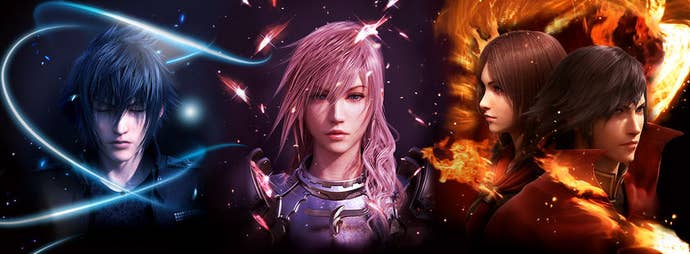
So the mythology itself, the Bible or the base foundation of the mythology, was created by Kazushige Nojima, who was the writer of Final Fantasy VII and such. He's been involved with our company for a long time. And then for XIII, Motomu Toriyama, the director, took one aspect of that mythology and focused on that. For XIII, the concept of the L'Cie, these people who have to dedicate their lives to fulfill the purpose of a certain god, that's where the focus of XIII landed. The L'Cie as a concept would be that they're built for a specific purpose, to serve a god in a very specific manner. That's the base concept of the L'Cie. They're on the kind of divine side of things.
While Mr. Toriyama took on the divine side of things, I took that same mythology from Mr. Nojima and concentrated more on the mortal side, the human side, and how humans would deal with events and with how gods are interacting in the same world. I wanted to focus more on that human element of the mythology. Mr. Toriyama went more along the fantasy road. I wanted a more realistic approach.
USG: Yeah, that's definitely the impression I got from what I played of Type 0.
HT: Did you play it in Japanese?
USG: Yeah, a bit. I didn't get to play it too much, but it seemed really interesting. I was disappointed it didn't come to the U.S.Is that something you're able to shed some light on? It was a very high-profile Final Fantasy title, the first not localized into English in a long time. That absence was felt by a lot of fans.
HT: Some honesty -- some modified honesty -- is required here. When Type 0 initially came out in Japan, we were already working on a localized version for the game. The work did actually start. It exists, to a degree. But at the time, when that work was progressing, the market for PSP in North America and Europe had very much gotten smaller. The projections we got from our overseas subsidiaries in Europe and the U.S. had also shrunk, together with the market.
But we were very conscious -- I was very conscious -- that despite the fact that we weren't able to provide the title at the time, there were many people who wanted to play it. I heard all the voices calling for it. An idea we had at the time was that, well, if the PSP market is shrinking, then maybe its successor, the PS Vita, was something we could consider for the title. At the time of this proposal, though, when we were talking about a Vita version, the number of Vita units in North America and Europe and what their expectations were, all that was very unclear. This was before it was launched, or right as it was being launched. These kinds of things were unclear, and the company was uncomfortable with going forward on the project without knowing more information about what the expectations were. Our final decision on that was to wait a bit and see what would happen.
This is more than the Tokyo office. This was the feedback we were getting from the overseas subsidiaries. They were all concerned about how well Vita would penetrate the market and how successful it would be. "Concern" is the operative word. They're the people who were closest to the users that would be wanting the product, so their voice was considered very carefully. Their assessment was that it would perhaps be a better idea to go the PS3 HD conversion route, which would be able to take in more users than the PS Vita.
With Agito coming up, our hope – my hope – is that we'll be able to provide users in North America and Europe with both Agito and Type 0 as a full experience.
When that proposal came along, this possible switch to a full console environment, as a person who was developing the title... I thought the general blueprint for how the game was made was for mobile, or at least a mobile console. The distance from which you look at the screen is different, as opposed to looking at a TV. Everything was made for this, the battle system and everything else. Now, if I was going to port it to the console environment, it would need a pretty large overhaul of the game systems.
And that would of course take a lot of time and money and man-hours. The decision we came to in the end was that we would wait until other technologies or other portable console emerged. We would see how the Vita actually did in the western markets. Then it would be more prudent to have a full picture of what was available and what would give us the best environment, both creatively and business-wise, for the game.
This was all going on about a year ago. Now, with Agito coming up, our hope – my hope – is that we'll be able to provide users in North America and Europe with both Agito and Type 0 as a full experience. That would be ideal, if we could provide both for the users. That's the direction we're going in right now. With Agito coming out, we can provide that full experience.
USG: So the prospect of a localized Type-0 isn't entirely off the table?
HT: Yes, it will definitely be localized. Obviously the release of Agito factors into this decision, but it wasn't just that. I now hear from the subsidiaries that Type-0 is something that they really want released in their regions. With Agito coming out -- Agito coming out is a certainty for North America and Europe -- the subsidiaries' opinion was that releasing Agito without having access to Type-0 would not be the best idea.
Well, let me modify this statement a bit. [Type-0's localization] is in the final stages of consideration. It's definitely the direction that we want to go in. Nothing is absolutely concrete right now with release dates or anything like that. But it's definitely something that we want to do. Really, the primary motivation behind wanting to release the whole experience would be all the support and passion and enthusiasm of the North American and European gaming community that has reached out to us and asked for it. I feel very thankful, very grateful for that enthusiasm.
[Note: Tabata and Square Enix later clarified that a U.S. release of Agito has not been confirmed, but that it is being localized with the intent of an overseas release, and that a Type 0 localization is in the final stages of planning. The statement I cited in yesterday's news piece was taken in part from this post-interview conversation.]
USG: So the idea of Type 0 coming west, that would be for PlayStation Network, and not a reworked version for iOS or other smartphones?
HT: Yeah. The current direction that we're going in is not the iOS or Android application route. But like you say, the same platform. It was originally designed for a handheld console environment, so that's what we're going for still.
USG: What is your take on the Vita market in general?
HT: On a personal level, I'm very interested in the Vita as hardware. But I'm very conscious of more practical elements of these game machines. I feel that one big thing we didn't handle well was... We weren't able to permeate the overseas PSP market while it was still at its peak. When Type 0 came out, it had already shrunk to a degree where that wasn't really doable.
When I consider the Vita in terms of the market and such, I'm much more concerned about how it's doing overseas – not domestically, here in Japan, but how people react to it in America and in Europe. That's how I'm going to establish priority as far as how seriously I consider Vita development. I'll use the overseas market as more of a compass than the domestic market. If it can make a little more noise than it's doing now, I'll be happy.
USG: Do you think Sony's push to promote the Vita as a second screen for PlayStation 4 will have much impact?
HT: Obviously, I feel like there are certain possibilities that arise when you talk about linking two consoles together. But also, at the same time, I have some concern. Say you buy a PS4, and you have a title for the PS4 that has that Vita connectivity. You buy one piece of hardware and then you have to buy another one for that full experience. I feel like that's a rather high hurdle. In some ways, it might be asking too much of some people.
Even when I'm considering design elements for something like Final Fantasy XV, these are the things that we wrestle with. We have to consider all our options, but that's definitely one of the considerations. Obviously, with something like XV for the PS4 and such, it's a very grand experience in full HD. You watch it on a huge screen at home. It's this almost transcendent experience, something larger than life. But I put more importance on accessibility when it comes to games. Everyone has something like this. If we have to make certain artistic or technical compromises to reach a larger population of people, that in itself is what I consider a success.
My whole motivation for joining Square Enix, what I wanted to do here, was to create games that are close and accessible. It's my decision and my direction to go toward the mobile route.

[Tabata produces an iPhone running Agito]
Initially, when I came across the PSP environment, I had certain expectations of how a portable experience should be. Now, the expectations I had of the PSP are basically being met on something like this. I feel like at this point, quality-wise, it's even above the PSP's level of quality. Just the practicality element is really what strikes me about environments like this.
In Japan, a lot of people carry around portable gaming devices, but with something like this, even adults that don't really play games will have an iPhone with them. I feel that with games that are supposed to be... With these kinds of everyday type games, where you're always in contact with it, as opposed to a grand otherworldly experience, the practical element has to come to the forefront. You need something close to you in order to make this work, a game that's supposed to be a close experience to your life.
USG: You sort of answered this, but it does seem that, aside from Final Fantasy XV, you've really gravitated toward portable systems. Is that because it interests you? Are they simply what you've been assigned to work on?
HT: My whole motivation for joining Square Enix, what I wanted to do here, was to create games that are close and accessible. It's my decision and my direction to go toward the mobile route. That was my motivation initially, at least, but now I have an equal passion for HD games as well.
USG: What, in your opinion, makes a good portable game?
HT: I feel like there are two very important elements of a good mobile title. One, flexibility in terms of when you can play it. Being able to not have to assign a time slot to when you play it. To be able to incorporate playing it into your general life schedule is very important.
The second thing is... the Japanese word is "distance" or "intimacy." But I need something that's close both distance-wise and emotion-wise. I feel like there's a connection between physical distance and closeness in the emotional sense. I feel like, when you have this distance between you and the screen, there's more of this emotional bond between you and the game. To have this right kind of distance is very important.
USG: That's interesting. I've never heard anyone say that, but that's actually why I play portable games so much. Are there any other games, besides the ones that you've worked on, that you look at and feel like they do a great job of being an ideal portable experience? Do you draw inspiration from any other people's work?
HT: The final confession I have to make is that I don't know very much about other people's games. In terms of the stuff that I work on, I try to make that intimacy and flexibility very apparent in everything I work on, like Crisis Core.
The one thing I'd point out in terms of flexibility, it's not really time management so much as place management. You should be able to play wherever you want to – in your room or when you're outside. That's very important to that kind of intimacy element in the game. For the game to be just part of your life, to be within your lifestyle and be this close to you, creates this kind of intimacy between you and the game. That's something I always work to incorporate in things like Type 0 and Crisis Core.
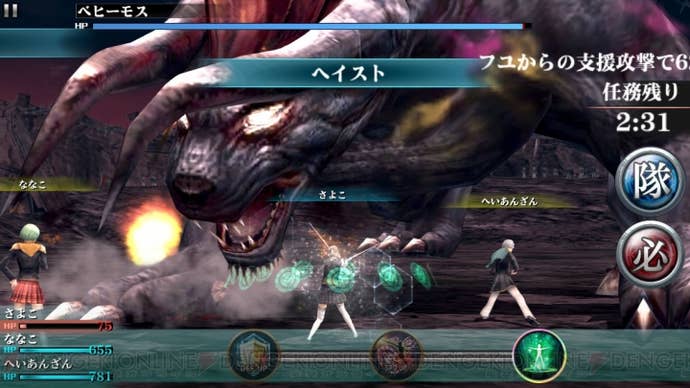
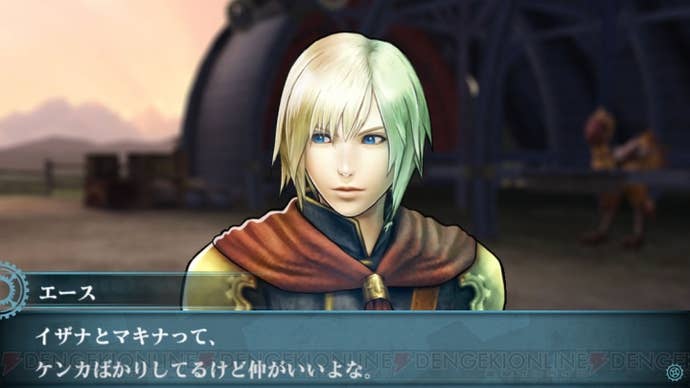
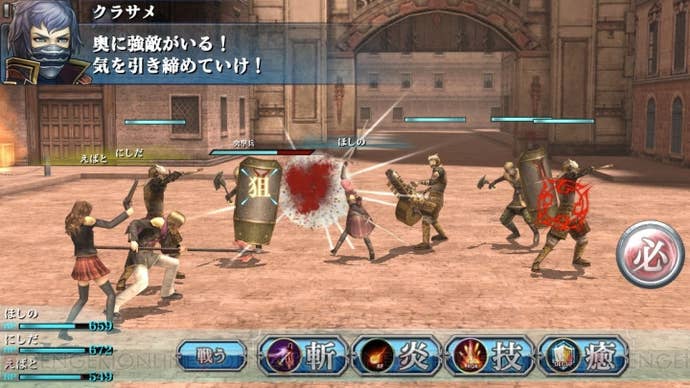
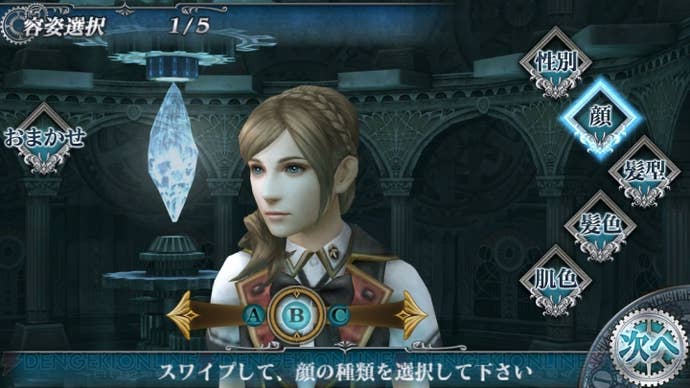
I can think of one example from another title, though, which is Monster Hunter. The type of communication that goes on is different from playing an FPS over the internet or something like that. You all have to be very close to each other. You all have your own console, but you're sitting right next to all the people you're playing with, and you have this, not just verbal, but very close, intimate communication with something that's happening in real time. You can garner reactions in a really tactile fashion. I think it's quite an accomplishment, to create that experience from a video game standpoint. I'm very impressed with the time management in the game, too, where almost any mission that you do together in that environment takes only maybe 30 minutes to an hour. To compress the experience and manage it in that small time frame is impressive.
USG: You've talked a lot about the intimacy of portable games, but you also said that you've developed a passion for HD games. You described Final Fantasy XV as this grand, majestic experience. But how do you bring that portable intimacy to something on the big screen, that's such a movie-like experience. Is that something you can do? And if not, how do you compensate for that?
HT: The major difference between mobile and HD... Here, the intimacy advantage is that there's nothing between you and the screen. When you hold it about here, there's almost nothing in between. Whereas when you look at something like that [gestures at a nearby television], even from here, there are all these computer screens and bottles and stuff in the way. It's very hard to get the immersion that you would from a mobile screen.
I personally, these days – to make another confession – only really play portable games. The personal projects that I want to do will always be in this kind of environment.
But I feel that in terms of the next-generation consoles and games, you'll be able to overcome that kind of disadvantage that I just pointed out with just the presentation that's become possible in HD formats. It's like going to another country, almost. These kinds of experiences are like the culture shock that you feel when you arrive in another country and see all the different sights, even if there may be all this stuff in the background and such. The technology will be good enough that you can create a similar experience, just on an HD screen. That's the kind of thing you'll have to start focusing on in order to provide a similar kind of intimacy.
What you lack in this physical advantage, you make up for in the presentation, how much better you can present things than you can here. The expression that you can have in an HD environment will just astonish people enough that they forget they're in a room with a TV.
USG: But you don't plan to give up portable title development, do you?
HT: I personally, these days – to make another confession – only really play portable games. I've gotten away from consoles myself. The personal projects that I want to do will always be in this kind of environment. It's a lifestyle concern too, because now that I'm married and have a family and kids, I can't have the TV all to myself.
USG: Yeah, same here.
HT: [laughs] I feel like I'm hardly the only one with that kind of issue, so I want to provide an environment suited to that kind of lifestyle. I'm glad that I've found a kindred spirit.



